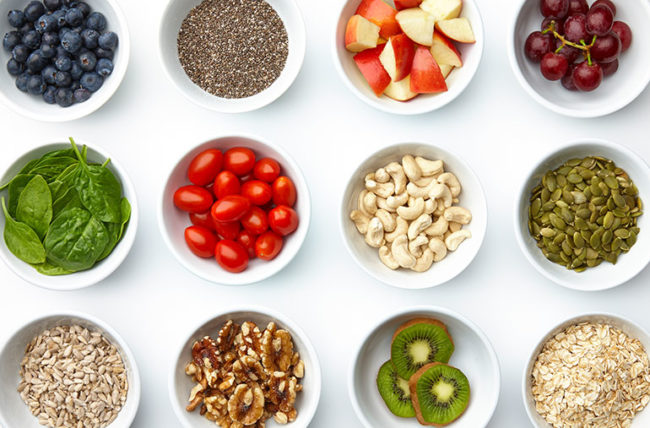Maintaining a balanced diet is key to promoting optimal health and well-being. One aspect of a balanced diet that has gained attention in recent years is the concept of alkaline foods. The idea behind alkaline foods is that they can help balance the pH level in our bodies, which is believed to have numerous health benefits. In this article, we will explore what are alkaline foods even are, their potential benefits, and provide a list of what are good alkaline foods to incorporate into your diet.
What Are Alkaline Foods?
Alkaline foods, also known as alkalizing foods, are those that have an alkaline effect on the body when metabolized. The pH scale measures the acidity or alkalinity of substances, with 0 being highly acidic, 7 being neutral, and 14 being highly alkaline. Our body’s pH levels can vary in different parts, but overall, it aims to maintain a slightly alkaline environment.
When we consume foods, they are broken down and metabolized, leaving either an acidic or alkaline residue in the body. Alkaline foods, such as fruits, vegetables, and certain grains, are believed to leave an alkaline residue after digestion. These foods can help balance the pH level in our body, reducing the acidity and promoting a more alkaline environment.
Potential Benefits of Good Alkaline Foods
Advocates of alkaline diets claim that consuming more alkaline foods can provide several health benefits, including:
- Improved Digestion: Alkaline foods are often rich in fiber, which can support healthy digestion and prevent constipation.
- Bone Health: Some studies suggest that an alkaline diet may help preserve bone density and reduce the risk of osteoporosis.
- Increased Energy Levels: Alkaline foods are typically nutrient-dense and can provide a natural energy boost.
- Reduced Inflammation: Alkaline foods, particularly fruits and vegetables, are known for their anti-inflammatory properties, which may help alleviate symptoms of inflammatory conditions.
- Weight Management: Alkaline foods are often low in calories and high in fiber, which can support weight loss and weight management efforts.
- Improved Skin Health: A balanced pH level can contribute to healthier skin, reducing the risk of acne and other skin issues.
What Are Good Alkaline Foods To Include In Your Diet?
Fruits:
- Citrus fruits (lemons, oranges, grapefruits): High in vitamin C and antioxidants, citrus fruits support immune function, promote skin health, and aid in digestion.
- Watermelon: Hydrating and rich in vitamins A and C, watermelon helps maintain proper hydration, supports heart health, and promotes healthy skin.
- Avocado: Packed with healthy fats, avocados provide satiety, support brain health, and contribute to a healthy heart.
- Berries (strawberries, blueberries, raspberries): Loaded with antioxidants and fiber, berries help fight inflammation, support brain health, and contribute to healthy digestion.
Vegetables:
- Leafy greens (spinach, kale, Swiss chard): Rich in vitamins, minerals, and antioxidants, leafy greens promote bone health, support eye health, and aid in detoxification.
- Broccoli: High in fiber and antioxidants, broccoli supports digestion, promotes heart health, and strengthens the immune system.
- Cucumber: Hydrating and low in calories, cucumbers support hydration, aid in weight management, and provide essential vitamins and minerals.
- Celery: Known for its high water content and low calorie count, celery supports hydration, aids in digestion, and contributes to heart health.
- Bell peppers: Packed with vitamin C and antioxidants, bell peppers promote healthy skin, support immune function, and contribute to eye health.
- Carrots: Rich in beta-carotene, carrots promote eye health, support healthy skin, and contribute to immune function.
Nuts and Seeds:
- Almonds: High in healthy fats, fiber, and vitamin E, almonds support heart health, aid in weight management, and provide essential nutrients.
- Walnuts: Rich in omega-3 fatty acids, walnuts support brain health, promote heart health, and have anti-inflammatory properties.
- Flaxseeds: Packed with fiber and omega-3 fatty acids, flaxseeds support digestion, aid in weight management, and have potential anti-cancer properties.
- Chia seeds: High in fiber and omega-3 fatty acids, chia seeds support digestion, promote heart health, and aid in weight management.
- Pumpkin seeds: Rich in antioxidants and essential minerals, pumpkin seeds support heart health, promote healthy skin, and aid in sleep regulation.
Legumes:
- Lentils: High in fiber and plant-based protein, lentils support digestion, promote heart health, and aid in blood sugar management.
- Chickpeas: Packed with protein and fiber, chickpeas support weight management, promote digestive health, and contribute to heart health.
- Kidney beans: Rich in fiber and plant-based protein, kidney beans support digestion, aid in weight management, and promote heart health.
- Black beans: High in fiber and antioxidants, black beans support digestion, contribute to heart health, and aid in blood sugar regulation.
Whole Grains:
- Quinoa: A complete protein source, quinoa supports muscle growth and repair, aids in weight management, and provides essential minerals.
- Amaranth: High in protein and fiber, amaranth supports digestive health, promotes bone health, and aids in weight management.
- Millet: Gluten-free and rich in antioxidants, millet supports heart health, aids in digestion, and provides essential nutrients.
- Brown rice: A good source of complex carbohydrates and fiber, brown rice supports digestion, aids in weight management, and provides sustained energy.
Herbal Teas:
- Green tea: Loaded with antioxidants, green tea supports metabolism, promotes brain health, and aids in weight management.
- Chamomile tea: Known for its calming properties, chamomile tea supports relaxation, aids in sleep quality, and promotes digestion.
- Peppermint tea: Soothing and refreshing, peppermint tea supports digestion, alleviates digestive discomfort, and promotes relaxation.
Healthy Oils:
- Olive oil: Rich in monounsaturated fats and antioxidants, olive oil supports heart health, promotes brain function, and has anti-inflammatory properties.
- Coconut oil: Contains medium-chain triglycerides (MCTs) that provide quick energy, coconut oil supports brain health, aids in weight management, and has antimicrobial properties.
- Avocado oil: High in monounsaturated fats, avocado oil supports heart health, promotes skin health, and aids in nutrient absorption.
It’s important to note that while these foods have an alkaline effect on the body, they should be consumed as part of a balanced diet that includes a variety of nutrient-rich foods. Balance is key, and it’s essential to incorporate both alkaline and acidic foods into your meals.
Good alkaline foods can be a valuable addition to a balanced diet, offering potential health benefits and helping to maintain a healthy pH level in the body. By incorporating alkaline foods such as fruits, vegetables, nuts, and legumes into your meals, you can enhance your overall well-being and support optimal health. Remember to consult with a healthcare professional or registered dietitian before making any significant dietary changes, especially if you have specific health concerns or conditions. Embrace the power of alkaline foods and enjoy the delicious flavors and nourishment they bring to your table.





